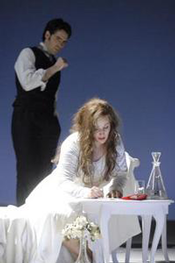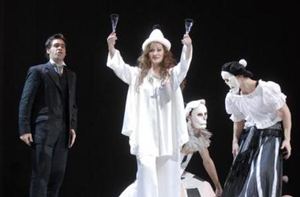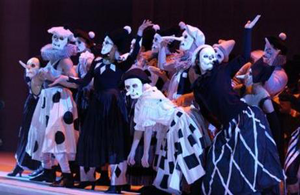
04 Jun 2007
“La Traviata” from the Volksoper Wien
In Verdi’s beloved opera, love does not conquer all but the sweet-taste of what “might have been” lingers on our lips forever when we think of the beautiful Violetta.
English Touring Opera are delighted to announce a season of lyric monodramas to tour nationally from October to December. The season features music for solo singer and piano by Argento, Britten, Tippett and Shostakovich with a bold and inventive approach to making opera during social distancing.
This tenth of ten Live from London concerts was in fact a recorded live performance from California. It was no less enjoyable for that, and it was also uplifting to learn that this wasn’t in fact the ‘last’ LfL event that we will be able to enjoy, courtesy of VOCES8 and their fellow vocal ensembles (more below …).
Ever since Wigmore Hall announced their superb series of autumn concerts, all streamed live and available free of charge, I’d been looking forward to this song recital by Ian Bostridge and Imogen Cooper.
Although Stile Antico’s programme article for their Live from London recital introduced their selection from the many treasures of the English Renaissance in the context of the theological debates and upheavals of the Tudor and Elizabethan years, their performance was more evocative of private chamber music than of public liturgy.
Evidently, face masks don’t stifle appreciative “Bravo!”s. And, reducing audience numbers doesn’t lower the volume of such acclamations. For, the audience at Wigmore Hall gave soprano Elizabeth Llewellyn and pianist Simon Lepper a greatly deserved warm reception and hearty response following this lunchtime recital of late-Romantic song.
For this week’s Live from London vocal recital we moved from the home of VOCES8, St Anne and St Agnes in the City of London, to Kings Place, where The Sixteen - who have been associate artists at the venue for some time - presented a programme of music and words bound together by the theme of ‘reflection’.
'Such is your divine Disposation that both you excellently understand, and royally entertaine the Exercise of Musicke.’
‘And there was war in heaven: Michael and his angels fought against the dragon; and the dragon fought and his angels, And prevailed not; neither was their place found any more in heaven … that old serpent … Satan, which deceiveth the whole world: he was cast out into the earth, and his angels were cast out with him.’
There was never any doubt that the fifth of the twelve Met Stars Live in Concert broadcasts was going to be a palpably intense and vivid event, as well as a musically stunning and theatrically enervating experience.
‘Love’ was the theme for this Live from London performance by Apollo5. Given the complexity and diversity of that human emotion, and Apollo5’s reputation for versatility and diverse repertoire, ranging from Renaissance choral music to jazz, from contemporary classical works to popular song, it was no surprise that their programme spanned 500 years and several musical styles.
The Academy of St Martin in the Fields have titled their autumn series of eight concerts - which are taking place at 5pm and 7.30pm on two Saturdays each month at their home venue in Trafalgar Square, and being filmed for streaming the following Thursday - ‘re:connect’.
The London Symphony Orchestra opened their Autumn 2020 season with a homage to Oliver Knussen, who died at the age of 66 in July 2018. The programme traced a national musical lineage through the twentieth century, from Britten to Knussen, on to Mark-Anthony Turnage, and entwining the LSO and Rattle too.
With the Live from London digital vocal festival entering the second half of the series, the festival’s host, VOCES8, returned to their home at St Annes and St Agnes in the City of London to present a sequence of ‘Choral Dances’ - vocal music inspired by dance, embracing diverse genres from the Renaissance madrigal to swing jazz.
Just a few unison string wriggles from the opening of Mozart’s overture to Le nozze di Figaro are enough to make any opera-lover perch on the edge of their seat, in excited anticipation of the drama in music to come, so there could be no other curtain-raiser for this Gala Concert at the Royal Opera House, the latest instalment from ‘their House’ to ‘our houses’.
"Before the ending of the day, creator of all things, we pray that, with your accustomed mercy, you may watch over us."
The doors at The Metropolitan Opera will not open to live audiences until 2021 at the earliest, and the likelihood of normal operatic life resuming in cities around the world looks but a distant dream at present. But, while we may not be invited from our homes into the opera house for some time yet, with its free daily screenings of past productions and its pay-per-view Met Stars Live in Concert series, the Met continues to bring opera into our homes.
Music-making at this year’s Grange Festival Opera may have fallen silent in June and July, but the country house and extensive grounds of The Grange provided an ideal setting for a weekend of twelve specially conceived ‘promenade’ performances encompassing music and dance.
There’s a “slide of harmony” and “all the bones leave your body at that moment and you collapse to the floor, it’s so extraordinary.”
“Music for a while, shall all your cares beguile.”
The hum of bees rising from myriad scented blooms; gentle strains of birdsong; the cheerful chatter of picnickers beside a still lake; decorous thwacks of leather on willow; song and music floating through the warm evening air.

In Verdi’s beloved opera, love does not conquer all but the sweet-taste of what “might have been” lingers on our lips forever when we think of the beautiful Violetta.
Before attending the Volksoper’s season première of La Traviata, I had only days before visited the tomb of the great man in Milan. As I stood at the foot of Verdi’s grave, it became a vibrant reality that here lay one of the greatest musical dramatists in history and what’s more, he was human; made of flesh like the rest of us and left us with a legacy of operas that have withstood the test of time and continued to influence and instruct us on human behaviour and emotion. The Traviata presented at the Volksoper was not at all what Signor Verdi would have had in mind for his beloved Violetta.
The stage was pre-set with soprano, Roxana Briban, lying on a white bed in full view of the audience for at least half-an-hour prior to the Prelude. The stage was minimalist, and at first it seemed acceptable to use a minimalistic set since this opera is really about characters and the depths of their emotions, not visual displays and spectacular props. Maestro Leopold Hager and the Orchester der Volksoper Wien opened the opera with a precise tempo and inflection in the Prelude, but it perhaps lacked the dramatic intensity that Verdi’s “high strings” should produce. Meanwhile, Violetta stretched her hand out toward a little girl standing behind a scrim, tossing a large plastic ball up and down. It was evident that Violetta was hallucinating and seeing herself as a child during the Prelude, a concept that may have worked well, but ended up failing in the end.
The dramatic opening was immediately interrupted by a masquerade complete with “masks” and clown-like costumes; obviously, a different perspective from the typical ballroom party with flowing gowns and tuxedos. The orchestra here began its slow and painful detachment from the vocal component of the opera and unfortunately Maestro Hager never fully regained a sense of unity. The “Brindisi” was rather boring in this masquerade-like conception; with young tenor, Ismael Jordi trying his best to produce a sense of gaiety and excitement. A very handsome and sincere performer, his tenor was very light for a role of this intensity and often imprecise; especially taking Verdi’s orchestral support into consideration. Verdi differs from Puccini in that he often leaves the tenor exposed at the ends of passages and in the higher tessitura with little orchestral foundation. Mr. Jordi would have made a better Almaviva in Il Barbiere di Siviglia than an Alfredo at this point in his career.
Most disturbing was the stage direction for the party-scene, with Violetta changing, on-stage, into a clown outfit. Verdi’s intention was to have the audience witness her at her most exquisite: beautiful, full-of-life, and healthy (or so we believe…or maybe want to believe); but here, the direction casts her in a pantomime outfit and in the same pale white in which she would later die. Her entrances in Un dì felice were detached from the orchestral fabric and she lacked any sense of legato singing whatsoever. The orchestra was almost in another realm from Alfredo and Violetta here, and the duet was spastic and unfocused rather than the intended display of profound passion. The pair did not once look at each other throughout the duet and the necessary spark that audiences crave between Alfredo and Violetta would never be ignited in this production.
 The first exhilarating moment…or what should have been, comes in Violetta’s Ah, fors’è lui che
l’anima, however it was not Violetta’s persona that became apparent here; rather, it was Ms.
Briban’s vocal and technical instability. It became clear that Maestro Hager and she were not in
sync and this aria became a fight for control. She stood in the center of the stage with the
rotating set moving around her. Her Italian enunciation was less than acceptable and she was
often out-of-tune on her pianissimi. It was as if Ms. Briban sang with three different voices
rather than the type of unified voice most vocal pedagogues and technicians impress upon the
young singers of today. Her low tessitura was extremely heavy for a Violetta, the middle was
pushed and strident. Her well-publicized pianissimi were so fabricated that one could hardly
hear them because she was, in fact, closing off the throat and air supply rather than using proper
breath support and an open throat to float them in a resonant place alla Leontyne Price or, more
recently, Renée Fleming. The bell-like quality of Violetta’s singing was missing. The Sempre
Libera was painful, and Ms. Briban was exuding huge waves of voice and then it would cut out
without transition from one part of the voice to another. Her missed entrance of Violetta’s
“Follie! Follie!” was enough to make any aficionado cringe and an embarrassment to the
Volksoper as a whole.
The first exhilarating moment…or what should have been, comes in Violetta’s Ah, fors’è lui che
l’anima, however it was not Violetta’s persona that became apparent here; rather, it was Ms.
Briban’s vocal and technical instability. It became clear that Maestro Hager and she were not in
sync and this aria became a fight for control. She stood in the center of the stage with the
rotating set moving around her. Her Italian enunciation was less than acceptable and she was
often out-of-tune on her pianissimi. It was as if Ms. Briban sang with three different voices
rather than the type of unified voice most vocal pedagogues and technicians impress upon the
young singers of today. Her low tessitura was extremely heavy for a Violetta, the middle was
pushed and strident. Her well-publicized pianissimi were so fabricated that one could hardly
hear them because she was, in fact, closing off the throat and air supply rather than using proper
breath support and an open throat to float them in a resonant place alla Leontyne Price or, more
recently, Renée Fleming. The bell-like quality of Violetta’s singing was missing. The Sempre
Libera was painful, and Ms. Briban was exuding huge waves of voice and then it would cut out
without transition from one part of the voice to another. Her missed entrance of Violetta’s
“Follie! Follie!” was enough to make any aficionado cringe and an embarrassment to the
Volksoper as a whole.
Once this disaster was over, the drama ceased to one ignited scream of “Brava!” and immediately the entire audience mimicked the audience member. WHAT HAS THE OPERA WORLD COME TO? Have we all succumbed to the glamour of beautiful faces and forgotten what this art is really about? In my opinion, we have conformed to mediocrity and this performance of Traviata would have had Signor Verdi rolling around in his grave. Who are we if we do not stand up and protect the wishes and aesthetics of the composer who creates with such diligence and precision? This production seemed more of a parody of Traviata than an actual presentation of it. Is it acceptable to stage anything as long as we stage it in half-inflected Italian, with loud and uneven voices and lots of clown outfits?! I stand in defense of Verdi’s honour and am appalled that a Viennese opera house would stage something of this mediocre caliber. Had this staging been performed somewhere where Verdi is seen as a national hero, like La Scala let’s say, there would have surely been a scandal in the streets.
Mr. Jordi entered to try and save what had been a disastrous competition between conductor and soprano and unfortunately made it sound even more like an undergraduate performance by students. The only glimmer of light in this production was Baritone, Morten Frank Larsen, who was at least in character and dramatic. His Italian was better than his colleagues, although not where it should have been. His Pura siccome un angelo was somewhat strictly sung with a stagnant orchestral accompaniment. There was not much room for rubato or any shading and Maestro Hager kept it as strict as possible. Unfortunately, because of Mr. Larsen’s acting capabilities and his colleagues lack thereof, it seemed that he was more in love with Violetta than Alfredo was.
The chorus of Gypsies was the icing on the cake for this production imbued with clown-costumes and more of a Pagliacci-like atmosphere than anything. All at once the chorus from Carmen entered the stage!!!…well, they weren’t singing Bizet’s music but the chorus was decked out in red and black Spanish outfits and the men were bullfighters flirting nonsensically with the women. The chorus, although representative of Matadors, was very much detached from the music and the actions seemed to have nothing to do with the text that was being sung. Again, the audience seemed to accept this mish-mash of ideas that was incoherently held together by a struggling orchestra and conductor.
 Act III of Traviata should be a display of what Verdi does best. He pulls at our heartstrings and
in a moment of luscious melodrama he allows Violetta to read her letter to the sounds of the
orchestra. Briban spoke in a harsh and violent chest voice and let out a yelp that resembled
something that an Elektra would scream, rather than a Violetta. Her Addio del passato, the
highest point of Violetta’s dramatic personae was spastic and her actions seemed more like a
Lucia (mad) than a consumptive Violetta. I felt no sympathy for her character as the uneven and
imprecise singing was enhanced by Ms. Briban’s throwing herself violently on the stage with
such a thud that I wondered if she had hurt herself. There was no saving Violetta by this point, or
the production for that matter.
Act III of Traviata should be a display of what Verdi does best. He pulls at our heartstrings and
in a moment of luscious melodrama he allows Violetta to read her letter to the sounds of the
orchestra. Briban spoke in a harsh and violent chest voice and let out a yelp that resembled
something that an Elektra would scream, rather than a Violetta. Her Addio del passato, the
highest point of Violetta’s dramatic personae was spastic and her actions seemed more like a
Lucia (mad) than a consumptive Violetta. I felt no sympathy for her character as the uneven and
imprecise singing was enhanced by Ms. Briban’s throwing herself violently on the stage with
such a thud that I wondered if she had hurt herself. There was no saving Violetta by this point, or
the production for that matter.
The end had Violetta, who had remained in her white negligee throughout, lying back on her bed with her outstretched hand motioning to the little girl tossing the big plastic ball up in the air.
In the end, she threw the ball and it went high into the rafters, representative of Violetta’s soul leaving her body. How Violetta’s soul can possibly be represented by a ball is beyond me. In all, this production could have been saved had the singing been at least precise and had Ms. Briban and Maestro Hager agreed on “one” way to perform this opera. It was an example of how two conflicting opinions can create havoc on-stage. What’s more, audiences of today seem to accept anything as long as it’s presented in an “opera house.” Just because something is performed on a stage does not necessarily mean that it deserves a scream of “Bravo.” At one time, the term “Bravo,” or “Brava” was used for fantastic and outstanding performances; the type that one remembers for years and years afterwards because of the immense talents of the performers, musicians, and directors. This performance of La Traviata did not deserve such accolades.
Mary-Lou Vetere-Borghoff
PhD (ABD), M.A., Mus.B